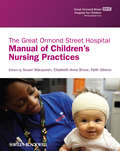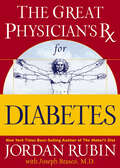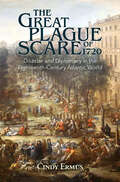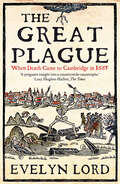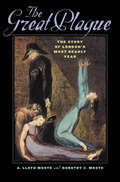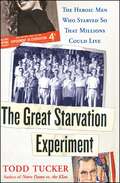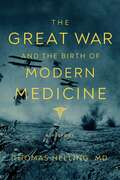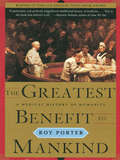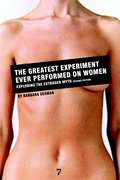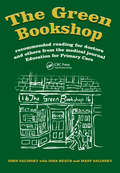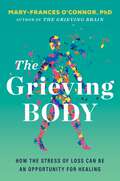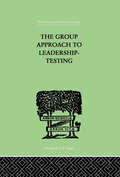- Table View
- List View
The Great Ormond Street Hospital Manual of Children's Nursing Practices
by Susan Macqueen Faith Gibson Elizabeth BruceClinical skills are a fundamental aspect of nursing care of children and young people. The Great Ormond Street Hospital Manual of Children's Nursing Practices is an evidence-based manual of practical skills in children's nursing which builds on the extensive expertise developed at Great Ormond Street Hospital. It encompasses all aspects of children's nursing from the most basic aspects of everyday practice to advanced practice in high dependency and intensive care to provide a comprehensive resource for all qualified nurses, students, and other health-care professionals involved in caring for children, both in the hospital and the community setting.Children's and young people's nursing presents unique challenges. The Great Ormond Street Hospital Manual utilises the latest clinical research and expert clinical knowledge to address these challenges, and provides the underlying theory and evidence for nursing care of children. It provides a definitive guide to clinical skills procedures in children's and young people's nursing which enables nurses working with children and young people to practice confidently and deliver clinically effective family-centred care.Key featuresOffers access to clinical procedures developed through the extensive expertise from Great Ormond Street HospitalContains evidence-based recommendations for expert careEncompasses all aspects of children's careContains procedures guidelines students can rely on and effectively use in practice following qualficationHighlights specific needs of neonates and adolescentsPlaced in the context of inter-disciplinary care of the childIncludes the rationale for each procedure - the 'why' as well as 'how'Information presented in a similar way to The Royal Marsden Manual of Clinical Nursing Procedures - offering continuity to those working in both adult and paediatric settings
The Great Ormond Street Hospital Nurse: My Life As A Student Nurse In The 1960s
by Vanessa Martin“You must learn to hold in your feelings,” Matron said, firmly but not unkindly. “One day it will be your duty to support the family and other staff through this tragedy. You need to be strong.” From the first time Vanessa Martin sets foot inside the world’s most renowned children’s hospital, she knows that she will never have another dull moment. From her first confrontation with the legendary matron, to consoling hordes of worried parents and caring for the wonderful bundles of joy themselves, Vanessa enters a world full of laughter, heartache and, most importantly, hard work. In this heartwarming memoir of a passionate, determined young woman trying to help as many children as she can, Vanessa pulls back the curtain on the bustling world of 60s London, and tells the remarkable story of finding her place within it. Nostalgic, charming and full of heart, The Great Ormond Street Nurse is the heroic tale of a woman who has dedicated over 40 years to the NHS.
The Great Ormond Street Hospital Nurse: My Life As A Student Nurse In The 1960s
by Vanessa Martin“You must learn to hold in your feelings,” Matron said, firmly but not unkindly. “One day it will be your duty to support the family and other staff through this tragedy. You need to be strong.” From the first time Vanessa Martin sets foot inside the world’s most renowned children’s hospital, she knows that she will never have another dull moment. From her first confrontation with the legendary matron, to consoling hordes of worried parents and caring for the wonderful bundles of joy themselves, Vanessa enters a world full of laughter, heartache and, most importantly, hard work. In this heartwarming memoir of a passionate, determined young woman trying to help as many children as she can, Vanessa pulls back the curtain on the bustling world of 60s London, and tells the remarkable story of finding her place within it. Nostalgic, charming and full of heart, The Great Ormond Street Nurse is the heroic tale of a woman who has dedicated over 40 years to the NHS.
The Great Physician's Rx for Diabetes (The Great Physician's Rx)
by Jordan Rubin Joseph BrascoBestselling author Jordan Rubin, with David Remedios, M.D., shows how to adopt the 7 Keys in The Great Physician's Rx for Health and Wellness to focus aggressively on diabetes and develop a game plan against it.
The Great Plague Scare of 1720: Disaster and Diplomacy in the Eighteenth-Century Atlantic World (Global Health Histories)
by Cindy ErmusFrom 1720 to 1722, the French region of Provence and surrounding areas experienced one of the last major epidemics of plague to strike Western Europe. The Plague of Provence was a major disaster that left in its wake as many as 126,000 deaths, as well as new understandings about the nature of contagion and the best ways to manage its threat. In this transnational study, Cindy Ermus focuses on the social, commercial, and diplomatic impact of the epidemic beyond French borders, examining reactions to this public health crisis from Italy to Great Britain to Spain and the overseas colonies. She reveals how a crisis in one part of the globe can transcend geographic boundaries and influence society, politics, and public health policy in regions far from the epicentre of disaster.
The Great Plague: A People's History
by Evelyn LordFocusing on Britain&’s peasants, shopkeepers, and other commoners, this history of the deadly Black Plague is a &“local account of the countrywide calamity&” (The Times). In this intimate history of the extraordinary Black Plague pandemic that swept through the British Isles in 1665, Evelyn Lord focuses on the plague&’s effects on smaller towns, where every death was a singular blow affecting the entire community. Lord&’s fascinating reconstruction of life during plague times presents the personal experiences of a wide range of individuals, from historical notables Samuel Pepys and Isaac Newton to common folk who tilled the land and ran the shops. The Great Plague brings this dark era to vivid life—through stories of loss and survival from those who grieved, those who fled, and those who hid to await their fate. Includes maps, photos, and illustrations
The Great Plague: The Story of London's Most Deadly Year
by A. Lloyd Moote Dorothy C. MooteAn intimate portrait of the Great Plague of London.In the winter of 1664-65, a bitter cold descended on London in the days before Christmas. Above the city, an unusually bright comet traced an arc in the sky, exciting much comment and portending "horrible windes and tempests." And in the remote, squalid precinct of St. Giles-in-the-Fields outside the city wall, Goodwoman Phillips was pronounced dead of the plague. Her house was locked up and the phrase "Lord Have Mercy On Us" was painted on the door in red. By the following Christmas, the pathogen that had felled Goodwoman Phillips would go on to kill nearly 100,000 people living in and around London—almost a third of those who did not flee. This epidemic had a devastating effect on the city's economy and social fabric, as well as on those who lived through it. Yet somehow the city continued to function and the activities of daily life went on.In The Great Plague, historian A. Lloyd Moote and microbiologist Dorothy C. Moote provide an engrossing and deeply informed account of this cataclysmic plague year. At once sweeping and intimate, their narrative takes readers from the palaces of the city's wealthiest citizens to the slums that housed the vast majority of London's inhabitants to the surrounding countryside with those who fled. The Mootes reveal that, even at the height of the plague, the city did not descend into chaos. Doctors, apothecaries, surgeons, and clergy remained in the city to care for the sick; parish and city officials confronted the crisis with all the legal tools at their disposal; and commerce continued even as businesses shut down.To portray life and death in and around London, the authors focus on the experiences of nine individuals—among them an apothecary serving a poor suburb, the rector of the city's wealthiest parish, a successful silk merchant who was also a city alderman, a country gentleman, and famous diarist Samuel Pepys. Through letters and diaries, the Mootes offer fresh interpretations of key issues in the history of the Great Plague: how different communities understood and experienced the disease; how medical, religious, and government bodies reacted; how well the social order held together; the economic and moral dilemmas people faced when debating whether to flee the city; and the nature of the material, social, and spiritual resources sustaining those who remained.Underscoring the human dimensions of the epidemic, Lloyd and Dorothy Moote dramatically recast the history of the Great Plague and offer a masterful portrait of a city and its inhabitants besieged by—and defiantly resisting—unimaginable horror.
The Great Plague: The Story of London's Most Deadly Year
by A. Lloyd Moote Dorothy C. MooteUnderscoring the human dimensions of the epidemic, historian A. Lloyd Moote and microbiologist Dorothy C. Moote provide an engrossing and deeply informed account of 1665, a cataclysmic plague year in London.
The Great Psychotherapy Debate: The Evidence for What Makes Psychotherapy Work
by Bruce E. Wampold Zac E. ImelThe second edition of The Great Psychotherapy Debate has been updated and revised to expand the presentation of the Contextual Model, which is derived from a scientific understanding of how humans heal in a social context and explains findings from a vast array of psychotherapies studies. This model provides a compelling alternative to traditional research on psychotherapy, which tends to focus on identifying the most effective treatment for particular disorders through emphasizing the specific ingredients of treatment. The new edition also includes a history of healing practices, medicine, and psychotherapy, an examination of therapist effects, and a thorough review of the research on common factors such as the alliance, expectations, and empathy.
The Great Secret: The Classified World War Ii Disaster That Launched The War On Cancer
by Jennet ConantThe gripping story of a chemical weapons catastrophe, the cover-up, and how one American Army doctor’s discovery led to the development of the first drug to combat cancer, known today as chemotherapy. On the night of December 2, 1943, the Luftwaffe bombed a critical Allied port in Bari, Italy, sinking seventeen ships and killing over a thousand servicemen and hundreds of civilians. Caught in the surprise air raid was the John Harvey, an American Liberty ship carrying a top-secret cargo of 2,000 mustard bombs to be used in retaliation if the Germans resorted to gas warfare. When one young sailor after another began suddenly dying of mysterious symptoms, Lieutenant Colonel Stewart Alexander, a doctor and chemical weapons expert, was dispatched to investigate. He quickly diagnosed mustard gas exposure, but was overruled by British officials determined to cover up the presence of poison gas in the devastating naval disaster, which the press dubbed "little Pearl Harbor." Prime Minister Winston Churchill and General Dwight D. Eisenhower acted in concert to suppress the truth, insisting the censorship was necessitated by military security. Alexander defied British port officials and heroically persevered in his investigation. His final report on the Bari casualties was immediately classified, but not before his breakthrough observations about the toxic effects of mustard on white blood cells caught the attention of Colonel Cornelius P. Rhoads—a pioneering physician and research scientist as brilliant as he was arrogant and self-destructive—who recognized that the poison was both a killer and a cure, and ushered in a new era of cancer research led by the Sloan Kettering Institute. Meanwhile, the Bari incident remained cloaked in military secrecy, resulting in lost records, misinformation, and considerable confusion about how a deadly chemical weapon came to be tamed for medical use. Deeply researched and beautifully written, The Great Secret is the remarkable story of how horrific tragedy gave birth to medical triumph.
The Great Starvation Experiment: The Heroic Men Who Starved so That Millions Could Live
by Todd TuckerWhat does it feel like to starve? To feel your body cry out for nourishment, to think only of food? How many fitful, hungry nights must pass before dreams of home-cooked meals metastasize into nightmares of cannibalism? Why would anyone volunteer to find out? In The Great Starvation Experiment, historian Todd Tucker tells the harrowing story of thirty-six young men who willingly and bravely faced down profound, consuming hunger. As conscientious objectors during World War II, these men were eager to help in the war effort but restricted from combat by their pacifist beliefs. So, instead, they volunteered to become guinea pigs in one of the most unusual experiments in medical history -- one that required a year of systematic starvation. Dr. Ancel Keys was already famous for inventing the K ration when the War Department asked for his help with feeding the starving citizens of Europe and the Far East at the war's end. Fascists and Communists, it was feared, could gain a foothold in war-ravaged areas. "Starved people," Keys liked to say, "can't be taught Democracy." The government needed to know the best way to rehabilitate those people who had been severely underfed during the long war. To study rehabilitation, Keys first needed to create a pool of starving test subjects. Gathered in a cutting-edge lab underneath the football stadium at the University of Minnesota, Dr. Keys' test subjects forsook most food and were monitored constantly so that Dr. Keys and his scientists could study the effects of starvation on otherwise healthy people. While the weight loss of the men followed a neat mathematical curve, the psychological deterioration was less predictable. Some men drank quarts and quarts of water to fill their empty stomachs. One man chewed as many as forty packs of gum a day. One man mutilated himself to escape the experiment. Ultimately only four of the men were expelled from the experiment for cheating -- a testament to the volunteers' determination and toughness. To prevent atrocities of the kind committed by the Nazi doctors, international law now prevents this kind of experimentation on healthy people. But in this remarkable book, Todd Tucker captures a lost sliver of American history -- a time when cold scientific principles collided with living, breathing human beings. Tucker depicts the agony and endurance of a group of extraordinary men whose lives were altered not only for the year they participated in the experiment, but forever.
The Great Stink of Paris and the Nineteenth-Century Struggle against Filth and Germs
by David S. BarnesExplores the scientific and social factors that continue to influence the public's lingering uncertainty over how disease can—and cannot—be spread.Late in the summer of 1880, a wave of odors enveloped large portions of Paris. As the stench lingered, outraged residents feared that the foul air would breed an epidemic. Fifteen years later—when the City of Light was in the grips of another Great Stink—the public conversation about health and disease had changed dramatically. Parisians held their noses and protested, but this time few feared that the odors would spread disease. Historian David S. Barnes examines the birth of a new microbe-centered science of public health during the 1880s and 1890s, when the germ theory of disease burst into public consciousness. Tracing a series of developments in French science, medicine, politics, and culture, Barnes reveals how the science and practice of public health changed during the heyday of the Bacteriological Revolution.Despite its many innovations, however, the new science of germs did not entirely sweep away the older "sanitarian" view of public health. The longstanding conviction that disease could be traced to filthy people, places, and substances remained strong, even as it was translated into the language of bacteriology. Ultimately, the attitudes of physicians and the French public were shaped by political struggles between republicans and the clergy, by aggressive efforts to educate and "civilize" the peasantry, and by long-term shifts in the public's ability to tolerate the odor of bodily substances.
The Great Stink of Paris and the Nineteenth-Century Struggle against Filth and Germs
by David S. BarnesThe scientific and social history surrounding the 1880 incident of a foul odor in Paris and the development of public health culture that followed.Late in the summer of 1880, a wave of odors enveloped large portions of Paris. As the stench lingered, outraged residents feared that the foul air would breed an epidemic. Fifteen years later—when the City of Light was in the grips of another Great Stink—the public conversation about health and disease had changed dramatically. Parisians held their noses and protested, but this time few feared that the odors would spread disease.Historian David S. Barnes examines the birth of a new microbe-centered science of public health during the 1880s and 1890s, when the germ theory of disease burst into public consciousness. Tracing a series of developments in French science, medicine, politics, and culture, Barnes reveals how the science and practice of public health changed during the heyday of the Bacteriological Revolution.Despite its many innovations, however, the new science of germs did not entirely sweep away the older “sanitarian” view of public health. The longstanding conviction that disease could be traced to filthy people, places, and substances remained strong, even as it was translated into the language of bacteriology. Ultimately, the attitudes of physicians and the French public were shaped by political struggles between republicans and the clergy, by aggressive efforts to educate and “civilize” the peasantry, and by long-term shifts in the public’s ability to tolerate the odor of bodily substances.“A well-developed study in medically related social history, it tells an intriguing tale and prompts us to ask how our own cultural contexts affect our views and actions regarding environmental and infectious scourges here and now.” —New England Journal of Medicine“Both a captivating story and a sophisticated historical study. Kudos to Barnes for this valuable and insightful book that both physicians and historians will enjoy.” —Journal of the American Medical Association
The Great Transition
by Bruce CampbellIn the fourteenth century the Old World witnessed a series of profound and abrupt changes in the trajectory of long-established historical trends. Transcontinental networks of exchange fractured and an era of economic contraction and demographic decline dawned from which Latin Christendom would not begin to emerge until its voyages of discovery at the end of the fifteenth century. In a major new study of this 'Great Transition', Bruce Campbell assesses the contributions of commercial recession, war, climate change, and eruption of the Black Death to a far-reaching reversal of fortunes from which no part of Eurasia was spared. The book synthesises a wealth of new historical, palaeo-ecological and biological evidence, including estimates of national income, reconstructions of past climates, and genetic analysis of DNA extracted from the teeth of plague victims, to provide a fresh account of the creation, collapse and realignment of Western Europe's late medieval commercial economy.
The Great War and the Birth of Modern Medicine: A History
by Thomas HellingA startling narrative revealing the impressive medical and surgical advances that quickly developed as solutions to the horrors unleashed by World War I.The Great War of 1914-1918 burst on the European scene with a brutality to mankind not yet witnessed by the civilized world. Modern warfare was no longer the stuff of chivalry and honor; it was a mutilative, deadly, and humbling exercise to wipe out the very presence of humanity. Suddenly, thousands upon thousands of maimed, beaten, and bleeding men surged into aid stations and hospitals with injuries unimaginable in their scope and destruction. Doctors scrambled to find some way to salvage not only life but limb. The Great War and the Birth of Modern Medicine provides a startling and graphic account of the efforts of teams of doctors and researchers to quickly develop medical and surgical solutions. Those problems of gas gangrene, hemorrhagic shock, gas poisoning, brain trauma, facial disfigurement, broken bones, and broken spirits flooded hospital beds, stressing caregivers and prompting medical innovations that would last far beyond the Armistice of 1918 and would eventually provide the backbone of modern medical therapy. Thomas Helling&’s description of events that shaped refinements of medical care is a riveting account of the ingenuity and resourcefulness of men and women to deter the total destruction of the human body and human mind. His tales of surgical daring, industrial collaboration, scientific discovery, and utter compassion provide an understanding of the horror that laid a foundation for the medical wonders of today. The marvels of resuscitation, blood transfusion, brain surgery, X-rays, and bone setting all had their beginnings on the battlefields of France. The influenza contagion in 1918 was an ominous forerunner of the frightening pandemic of 2020-2021. For anyone curious about the true terrors of war and the miracles of modern medicine, this is a must read.
The Greatest Benefit to Mankind: A Medical History of Humanity (The Norton History of Science)
by Roy Porter"To combine enormous knowledge with a delightful style and a highly idiosyncratic point of view is Roy Porter's special gift, and it makes [this] book . . . alive and fascinating and provocative on every page."--Oliver Sacks, M.D. Hailed as "a remarkable achievement" (Boston Sunday Globe) and as "a triumph: simultaneously entertaining and instructive, witty and thought-provoking . . . a splendid and thoroughly engrossing book" (Los Angeles Times), Roy Porter's charting of the history of medicine affords us an opportunity as never before to assess its culture and science and its costs and benefits to mankind. Porter explores medicine's evolution against the backdrop of the wider religious, scientific, philosophical, and political beliefs of the culture in which it develops, covering ground from the diseases of the hunter-gatherers to today's threat of AIDS and ebola, from the clearly defined conviction of the Hippocratic oath to the muddy ethical dilemmas of modern-day medicine. Offering up a treasure trove of historical surprises along the way, this book "has instantly become the standard single-volume work in its field" (The Lancet). "The author's perceptiveness is, as usual, scalpel-sharp; his manner genially bedside; his erudition invigorating." - Simon Schama
The Greatest Experiment Ever Performed on Women: Exploding the Estrogen Myth
by Barbara SeamanWith the ardent tone of a close friend, Barbara Seaman draws on forty years of journalistic research to expose the "menopause industry" and shows how estrogen therapy often causes more problems--including breast cancer, heart attack, and stroke--than it cures. The Greatest Experiment Ever Performed on Women tracks the well-intentioned discovery of synthetic estrogen through the unconscionable and misleading promotion of a dangerous drug.
The Greek Doctor's Secret Son
by Jennifer TaylorFinding his son...and his bride? When nurse Amy Prentice takes her son to the island of Constantis to show him his Greek heritage, the last person she expects to see is Dr. Nico Leonides-the man who broke her heart...and Jacob's dad! But there's no denying that Nico, as he gets to know Jacob, proves to be a remarkable father. And as he bonds with Amy over their son, the love they once shared resurfaces. Now can Nico find the courage to share his own secret...and finally make them a real family?
The Green Bookshop: Recommended Reading for Doctors and Others from the Medical Journal Education for Primary Care (Radcliffe Ser.)
by Iona Heath Matthew Walters John SalinskyThe collection includes: *
The Green Elephant: The Healthcare Provider's Essential Guide to Understanding and Addressing Medical Cannabis and CBD
by Matthew Fogel Elizabeth Fogel Jean-Paul DedamThe Ultimate Resource for Cannabis-Based Therapy Backed by extensive research and medical expertise, The Green Elephant is the all-in-one guidebook for healthcare professionals looking to educate themselves on cannabis therapy to better provide guidance to their patients. Delving into the history, biology, chemistry, and pharmacological effects of cannabis and CBD-based therapy, The Green Elephant also explores the equally important areas of ethics in practice, cannabis&’ legal history, and current regulatory status — all to enable healthcare professionals to better serve their patients.The Green Elephant provides healthcare professionals with much-needed information on dosing instructions, potential drug interactions, long- and shortterm treatment plans, and much more. Cannabis therapy has the exciting potential to help millions of patients better manage their symptoms and enjoy a higher quality of life. The time has come for all healthcare professionals to discuss this green &“elephant in the room.&”
The Green Pharmacy: New Discoveries In Herbal Remedies For Common Diseases And Conditions From The World's Foremost Authority On Healing Herbs
by James A. DukeMany diseased and conditions for which we turn to modern medicine can also be treated naturally with healing herbs, medicinal food, other natural remedies--and these treatments can be safer, less expensive and possibly even more effective than traditional methods. Let Dr. James Duke, the world's leading authority on healing herbs, leads you through the vast world of natural remedies--from Anise for Asthma to Violet for Varicose Veins, and everything in between. With just a few trips to the health-food store, the supermarket, or your own backyard--and with the help of Dr. Duke--you'll have everything you need to create your own Natural Medicine Cabinet.
The Grid: 'A stunning thriller’ Terry Hayes, author of I AM PILGRIM
by Nick Cook'A highly original, electrifying read' The Times'A stylish, riveting thriller' Daily Mail'An assured page-turner ... it combines action and foreign locations with big ideas a la Dan Brown' Sunday TimesThe US President Thompson has been dreaming of his own death. A repeating nightmare that hounds him night after night that he can't ignore: something tells him it's not just a dream, it feels too real.Thompson's doctor, military psychiatrist Josh Cain, is summoned to a church tower near the White House. He thinks he is there to talk down another suicidal ex-Marine. But the man he finds tells him of a plot to kill Thompson, revealing secrets he can't possibly have known - just seconds before a sniper's bullet takes him out . . .Battles have been fought man to man, then machine to machine, and even in cyberspace. But now there is a different battlefield emerging: human consciousness and the fight for our minds.What readers are saying:'A classy, intelligent and reflective investigative thriller.''A layered plot, engaging characters and a spine chilling ring of truth to the plot, which lured me in and kept me trapped until the final page.''A real page turner with plenty of surprises and twists. Great read.''THE BEST BOOK THAT I'VE READ ALL YEAR!'
The Grieving Body: How the Stress of Loss Can Be an Opportunity for Healing
by Mary-Frances O'ConnorThe follow-up to celebrated grief expert, neuroscientist, and psychologist Dr. Mary-Frances O’Connor’s The Grieving Brain focuses on the impact of grief—and life’s other major stressors—on the human body. Coping with death and grief is one of the most painful human experiences. While we can speak to the psychological and emotional ramifications of loss and sorrow, we often overlook its impact on our physical bodies. Dr. Mary-Frances O’Connor specializes in the study of grief, and in The Grieving Body she shares vital scientific research, revealing imperative new insights on its profound physiological impact. As she did in The Grieving Brain, O’Connor combines illuminating studies and personal stories to explore the toll loss takes on our cardiovascular, endocrine, and immune systems and the larger implications for our long-term well-being.The Grieving Body addresses questions about how bereavement affects us, such as:Can we die of a broken heart?What happens in our bodies when we’re grieving?How do our coping behaviors affect our physical health?What is the cognitive impact of grief?Why are we more prone to illness during times of enormous stress?and moreResearch-backed, warm, and empathetic, The Grieving Body is an essential, hopeful read for those experiencing loss as well as their supportive friends and family.The Grieving Body is illustrated with black-and-white charts and graphs.
The Grim Reader: A Pharmacist's Guide to Putting Your Characters in Peril
by Miffie SeidemanMany authors draw from headlines or movies rather than personal experience to write drug-related scenes, and the result may be more fiction than fact. So, how can you craft a convincing scene involving accidental use of fentanyl-tainted pot or a murder attempt with grandma's pain pills?A much-needed resource, The Grim Reader details how to write medical scenarios that result in realistic page-turners. As drug inaccuracies multiply in screenplays, scripts, novels, and audio plays, Dr. Miffie Seideman, Pharm.D. provides writers (and editors) with the background and authenticity necessary to develop plausible plotlines, including: • Pertinent drug facts, tips, and symptoms • Symptom timelines • Tips for developing historically accurate scenes • Common street drug names and slang • Sample scenarios to demonstrate how to weave the information into a believable scene • Writing prompts to provide scene starters and offer practice Combining Seideman's pharmacology knowledge with her love for creative writing, The Grim Reader is the ultimate guide to help authors craft accurate drug scenes and avoid medical mistakes.
The Group Approach To Leadership-Testing
by Harris, HenryFirst Published in 1999. Routledge is an imprint of Taylor & Francis, an informa company.
